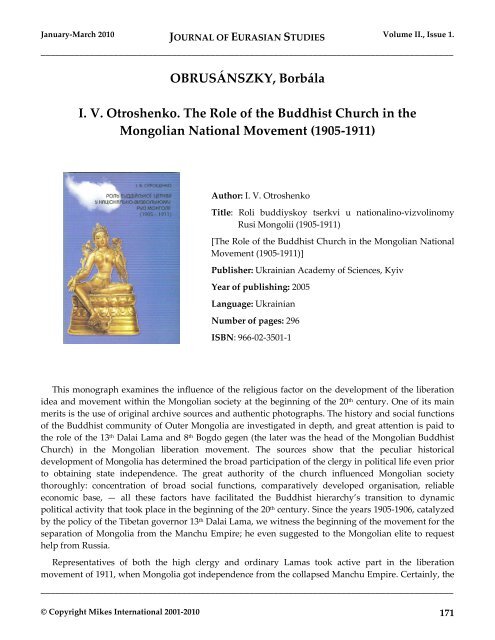EurasianStudies_0110..
EurasianStudies_0110..
EurasianStudies_0110..
You also want an ePaper? Increase the reach of your titles
YUMPU automatically turns print PDFs into web optimized ePapers that Google loves.
January-March 2010 JOURNAL OF EURASIAN STUDIES Volume II., Issue 1.<br />
_____________________________________________________________________________________<br />
OBRUSÁNSZKY, Borbála<br />
I. V. Otroshenko. The Role of the Buddhist Church in the<br />
Mongolian National Movement (1905-1911)<br />
Author: I. V. Otroshenko<br />
Title: Roli buddiyskoy tserkvi u nationalino-vizvolinomy<br />
Rusi Mongolii (1905-1911)<br />
[The Role of the Buddhist Church in the Mongolian National<br />
Movement (1905-1911)]<br />
Publisher: Ukrainian Academy of Sciences, Kyiv<br />
Year of publishing: 2005<br />
Language: Ukrainian<br />
Number of pages: 296<br />
ISBN: 966-02-3501-1<br />
This monograph examines the influence of the religious factor on the development of the liberation<br />
idea and movement within the Mongolian society at the beginning of the 20 th century. One of its main<br />
merits is the use of original archive sources and authentic photographs. The history and social functions<br />
of the Buddhist community of Outer Mongolia are investigated in depth, and great attention is paid to<br />
the role of the 13 th Dalai Lama and 8 th Bogdo gegen (the later was the head of the Mongolian Buddhist<br />
Church) in the Mongolian liberation movement. The sources show that the peculiar historical<br />
development of Mongolia has determined the broad participation of the clergy in political life even prior<br />
to obtaining state independence. The great authority of the church influenced Mongolian society<br />
thoroughly: concentration of broad social functions, comparatively developed organisation, reliable<br />
economic base, — all these factors have facilitated the Buddhist hierarchy’s transition to dynamic<br />
political activity that took place in the beginning of the 20 th century. Since the years 1905-1906, catalyzed<br />
by the policy of the Tibetan governor 13 th Dalai Lama, we witness the beginning of the movement for the<br />
separation of Mongolia from the Manchu Empire; he even suggested to the Mongolian elite to request<br />
help from Russia.<br />
Representatives of both the high clergy and ordinary Lamas took active part in the liberation<br />
movement of 1911, when Mongolia got independence from the collapsed Manchu Empire. Certainly, the<br />
_____________________________________________________________________________________<br />
© Copyright Mikes International 2001-2010 171

















